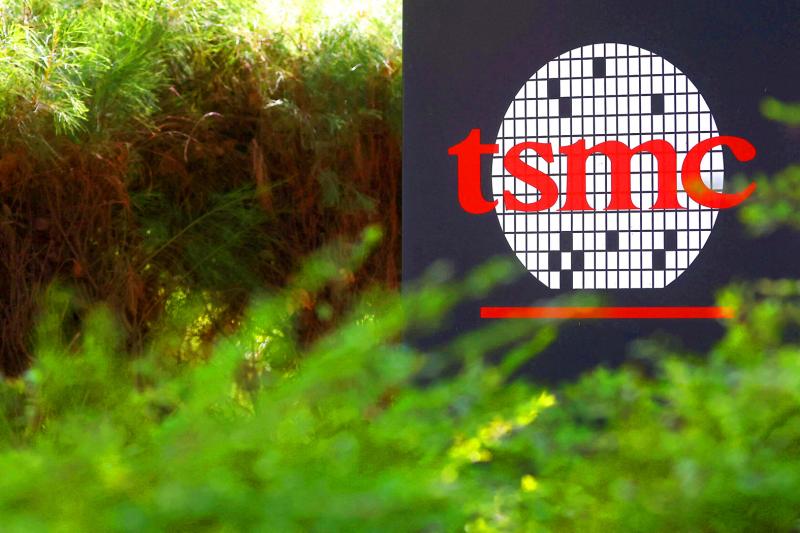Taiwan Semiconductor Manufacturing Co (TSMC, 台積電), the world’s largest contract chipmaker, paid NT$55 billion (US$1.84 billion) in corporate income tax last year, retaining its title as Taiwan’s biggest contributor, data compiled by the Ministry of Finance showed.
TSMC was the only company in Taiwan to pay more than NT$50 billion in corporation income tax last year, after the chipmaker posted a record profit of NT$596.54 billion, up more than 15 percent from 2020.
Chinese-language media reported that the chipmaker accounted for about 8.4 percent of the NT$652.4 billion in total corporate income tax revenue collected by the ministry last year, a 10 percent year-on-year increase.

Photo: Ann Wang, Reuters
After TSMC, Yang Ming Marine Transport Corp (陽明海運), one of Taiwan’s leading cargo shippers, took second place, paying about NT$27 billion in corporate income tax for profits made last year, the data showed.
Yang Ming benefitted from a freight rate surge driven by a shortage in cargo shipping services, robust demand and serious port congestion worldwide.
Fellow shipping line Wan Hai Lines Ltd (萬海航運) was the third-largest taxpayer, paying more than NT$15 billion in corporate income tax, the reports said.
Evergreen Marine Corp (長榮海運), Taiwan’s largest container cargo shipper, ranked fourth, paying more than NT$12 billion, the reports said.
The National Taxation Bureau’s branch responsible for New Taipei City, Taoyuan, and Hsinchu city and county collected the largest share of corporate tax among the taxation bureau’s five branches, with NT$256 billion last year, up more than NT$100 billion, or 64.16 percent, from a year earlier.
The bureau’s tax revenue was boosted by major tech companies with production bases in the Hsinchu Science Park (新竹科學園區), which is home to TSMC’s headquarters.

SELL-OFF: Investors expect tariff-driven volatility as the local boarse reopens today, while analysts say government support and solid fundamentals would steady sentiment Local investors are bracing for a sharp market downturn today as the nation’s financial markets resume trading following a two-day closure for national holidays before the weekend, with sentiment rattled by US President Donald Trump’s sweeping tariff announcement. Trump’s unveiling of new “reciprocal tariffs” on Wednesday triggered a sell-off in global markets, with the FTSE Taiwan Index Futures — a benchmark for Taiwanese equities traded in Singapore — tumbling 9.2 percent over the past two sessions. Meanwhile, the American depositary receipts (ADRs) of Taiwan Semiconductor Manufacturing Co (TSMC, 台積電), the most heavily weighted stock on the TAIEX, plunged 13.8 percent in

A wave of stop-loss selling and panic selling hit Taiwan's stock market at its opening today, with the weighted index plunging 2,086 points — a drop of more than 9.7 percent — marking the largest intraday point and percentage loss on record. The index bottomed out at 19,212.02, while futures were locked limit-down, with more than 1,000 stocks hitting their daily drop limit. Three heavyweight stocks — Taiwan Semiconductor Manufacturing Co (TSMC, 台積電), Hon Hai Precision Industry Co (Foxconn, 鴻海精密) and MediaTek (聯發科) — hit their limit-down prices as soon as the market opened, falling to NT$848 (US$25.54), NT$138.5 and NT$1,295 respectively. TSMC's

TARIFFS: The global ‘panic atmosphere remains strong,’ and foreign investors have continued to sell their holdings since the start of the year, the Ministry of Finance said The government yesterday authorized the activation of its NT$500 billion (US$15.15 billion) National Stabilization Fund (NSF) to prop up the local stock market after two days of sharp falls in reaction to US President Donald Trump’s new import tariffs. The Ministry of Finance said in a statement after the market close that the steering committee of the fund had been given the go-ahead to intervene in the market to bolster Taiwanese shares in a time of crisis. The fund has been authorized to use its assets “to carry out market stabilization tasks as appropriate to maintain the stability of Taiwan’s

In a small town in Paraguay, a showdown is brewing between traditional producers of yerba mate, a bitter herbal tea popular across South America, and miners of a shinier treasure: gold. A rush for the precious metal is pitting mate growers and indigenous groups against the expanding operations of small-scale miners who, until recently, were their neighbors, not nemeses. “They [the miners] have destroyed everything... The canals, springs, swamps,” said Vidal Britez, president of the Yerba Mate Producers’ Association of the town of Paso Yobai, about 210km east of capital Asuncion. “You can see the pollution from the dead fish.